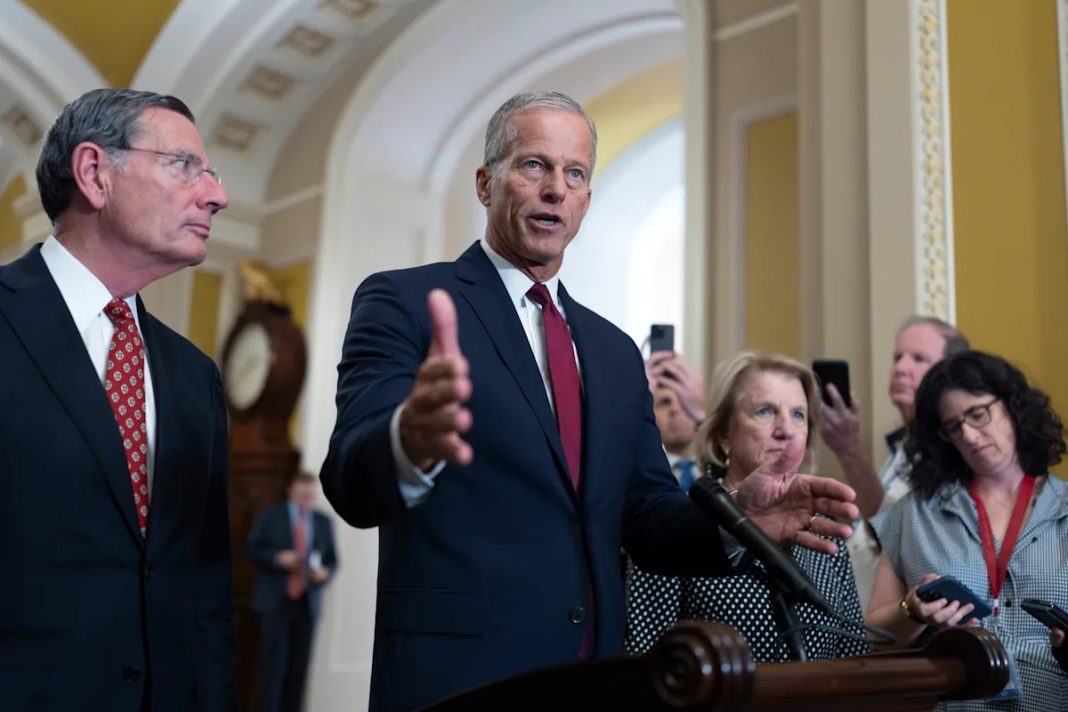WASHINGTON (AP) — Senate Majority Leader John Thune says he’s ready to change the chamber’s rules to allow quick confirmations of dozens of President Donald Trump’s executive branch nominees, moving this week to speed up votes after months of Democratic delays.
Thune says he’ll start the process of changing the rules when the Senate goes into session on Monday afternoon, with a final vote likely coming later this week. “We must return to the Senate’s traditional confirmation process that existed before this unprecedented blockade,” Thune said in an op-ed published on Breitbart.com Monday morning.
Republicans have been talking about options for changing the rules since early August, when the Senate left for a monthlong recess after a breakdown in bipartisan negotiations over the confirmation process. Democrats have blocked nearly every single one of Trump’s nominees, forcing majority Republicans to spend valuable floor time on procedural votes and leaving many positions in the executive branch unfilled.
The changes come after both parties have escalated their obstruction of the other party’s nominees for years, and as leaders in both parties have incrementally changed the rules to make the process less bipartisan. The proposal to group nominations is loosely based on legislation introduced by Democrats two years ago as Republicans blocked many of then-President Joe Biden’s picks.
But while Senate Republicans forced similar delays during Biden’s administration, Democrats have blocked almost all of Trump’s nominations. It’s the first time in recent history that the minority party hasn’t allowed at least some quick confirmations.
“Democrats have made President Donald Trump the first president on record to not have a single nominee confirmed via voice vote or unanimous consent, and they are forcing time-consuming votes on noncontroversial nominees who go on to be confirmed by large bipartisan margins,” Thune said in the op-ed.
The delays have infuriated Trump, who told Senate Democratic Leader Chuck Schumer to “GO TO HELL!” in a social media post after negotiations broke down over the process in early August.
Thune has not yet said how they will change the rules, but Republicans said last week that the leading option was to allow votes on large groups of nominees at once if a majority of senators agree. Currently, one senator’s objection can force days of votes on a single nominee.
If Republicans act quickly, they could confirm more than 100 of Trump’s pending nominations as soon as this week. The rules change is expected to only apply to executive branch nominations, not lifetime judicial appointments, and would exclude the most high-profile positions, such as Cabinet nominees, that require a longer debate time. Some others could also be excluded, such as nominees that are particularly controversial.
The process to change the rules will likely require several floor votes and the support of a simple majority, so at least 51 out of the chamber’s 53 Republicans. But most GOP senators appear to be on board.
The change will be the latest salvo in years of intensifying standoffs over presidential nominations. In 2013, Democrats changed Senate rules for executive branch and lower court judicial nominees to remove the 60-vote threshold for confirmations as Republicans blocked President Barack Obama’s picks. In 2017, Republicans did the same for Supreme Court nominees as Democrats tried to block Trump’s nomination of Justice Neil Gorsuch.
Democrats have said the rules change would be a mistake, especially as Senate Republicans will need Democratic votes to pass spending bills and other legislation moving forward.
Senate Democratic Leader Chuck Schumer said last week that Republicans’ proposed plan “guts the Senate’s constitutional role of advice and consent, weakens our checks and balances, and guarantees that historically bad nominees will only get worse with even less oversight.”

